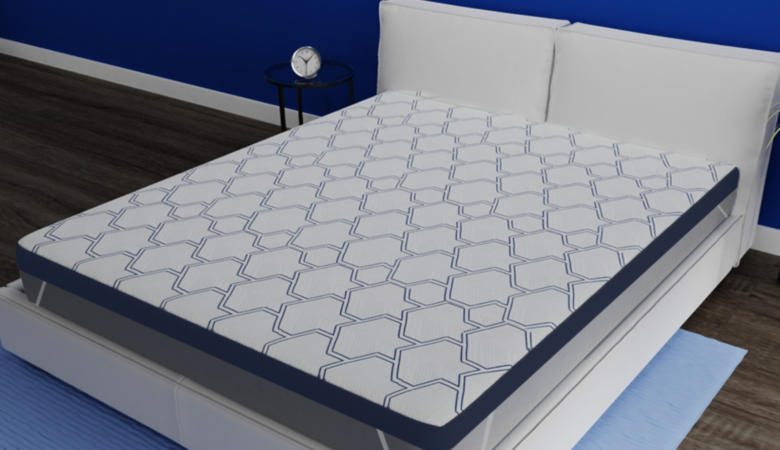When you get into bed at night, your mattress is the last thing you think about. But trust us, your mattress plays an essential role in your home. Your bed is your place of resting at night and has to be comfortable, supportive, and durable not a heavy mattress. Even though you might not realize it yet, the type of material your mattress is made of can significantly impact how comfortable it feels every night.
If you’ve ever gotten up after sleeping on a heavy or uncomfortable bed, you know exactly what we’re talking about here. The good news is that heavier mattresses are not necessarily a bad thing! In this article, we’ll explain why mattresses get heavy and how to fix this issue with your mattress to keep its health intact.
Understanding The Causes Of A Heavy Mattress
Innerspring and hybrid mattresses are less likely to gain weight compared to memory foam, organic, or latex mattress. But according to sleep experts, every bed takes up weight.
Most mattresses, especially organic and memory foam mattress, are made of cotton to let fabric breathe and substances pass through. It is intentionally made absorbent to comfort your body while you sleep and maintain a healthy body temperature.
The problem arises when you realize that the absorbent property of the mattress absorbs not only your body weight but also dust mites, dead skin cells, body fluid and other pollutants.
Latex mattresses are made of natural rubber latex and are the most expensive type of mattress. They’re generally more durable, but they’re also heavier than synthetic mattresses.
Synthetic mattresses are made of polyurethane and generally weigh about 10% less than the latex variety. They’re cheaper than latex mattresses, but they’re less durable. And are more likely to develop smell and dust mite issues over time.
Why Does A Mattress Get Heavy After Use?
Mattresses indeed gain weight over time. It can be because of various reasons-
- Sweat and dead skin: Body sweat and dead skin cells are contributing factors. Our body sweat, skin oil, and tears get absorbed in the form of body fluid, which over time, results in weighing down the mattress.
- Spill and stains: Even if you do not eat on your bed, you somehow end up drinking your favourite beverage or snacking and chilling on weekends over your bed. Hence, comes an accidental spillage, stains and crumbs accumulation.
- Dust mites: These are significant contributors to adding weight to your mattress. Our dead skin cells are food for dust mites. These are also causes of allergy issues.
- Fungi: Lack of ventilation and a humid environment can create perfect conditions for moulds and fungi to grow. Fungi result from unhygienic conditions that are harmful to your mattress and unhealthy for you.
- Compression: If you’ve ever noticed your bed getting heavier after sleeping on it, it could also be because of compression. Once you lie down on it, your body weight compresses the materials between the mattress, reducing material density.
Common Issues With A Heavier Mattress
For weight reasons, a heavier mattress, that of king size mattress, queen-size mattress or double bed-size mattress, when worn down, will result in a saggy, less supportive feel.
Comparatively, the single bed mattress is portable and easy to clean. Hence with regular care, they are more likely to be prevented from weighing faster.
One of the first things that happen is the elasticity in the mattress deteriorates, which means you’ll no longer sink into the bed as profoundly once you lie down.
We don’t want that! Heavier mattresses also tend to hold more moisture. This means that it’ll be harder to get clean. It is more difficult in the case of a queen mattress or mattress of king bed size, whether double or king single bed.
It’s recommended that you get your mattress professionally cleaned every six to nine months to ensure it stays as clean and comfortable as possible. You can also approach cleaning services for a mattress online.
How To Remedy A Heavy Mattress?
If you have a heavy mattress or if the type of bed mattress you’re using has weighed over the years, you can do a few things to remedy the situation. We’ll go over each of them below.
- Cover your mattress: Waterproof mattress protectors are highly recommended to keep your bed clean and healthy. It can be washed monthly and protect your mattress from dust, dust mites and other pollutants.
- Vacuum timely: Accumulated dead skin cells, dust, and dirt must be cleaned monthly. These particles not only add up to the weight of your mattress but also causes conditions like asthma, allergies and respiratory issues.
- Deep cleaning: Before vacuuming, you need to clean your mattress. It will get rid of fungi, dust mites and stains. You can use baking soda for the purpose or call professional services.
- Exposure to sunlight: Getting your mattress soaked in sunlight once or twice a year is sufficient to fight germs, fungi and dust mites. Sun rays are the best disinfectant.
- Flip your mattress: Flipping the mattress once or twice a year will spread out uneven wear and tear. It will prevent the bed from deteriorating over the same pressure spots and help the other side of the mattress breathe fresh air.
- Swapping out your mattress: If you are experiencing restless sleep and breathing problems and can see permanent dips in your bed, it’s time to replace your mattress with a new one.
The Take-Away
The type of mattress you choose can significantly impact your sleep quality. If your mattress is too heavy, it can strain you, and you’re having a more challenging time in bed. Looking into your options and finding a model that’s right for you is essential.
Livpure mattress provides you variety of mattresses to choose from, available in every size and shape. It’s essential to keep your bed in good condition to confirm your body’s good health. Hence, choose the best mattress for your health








